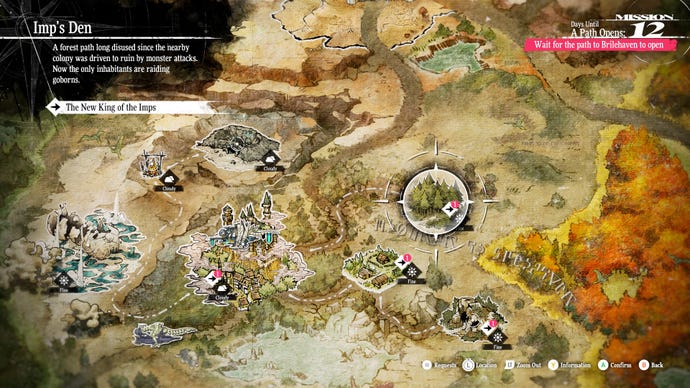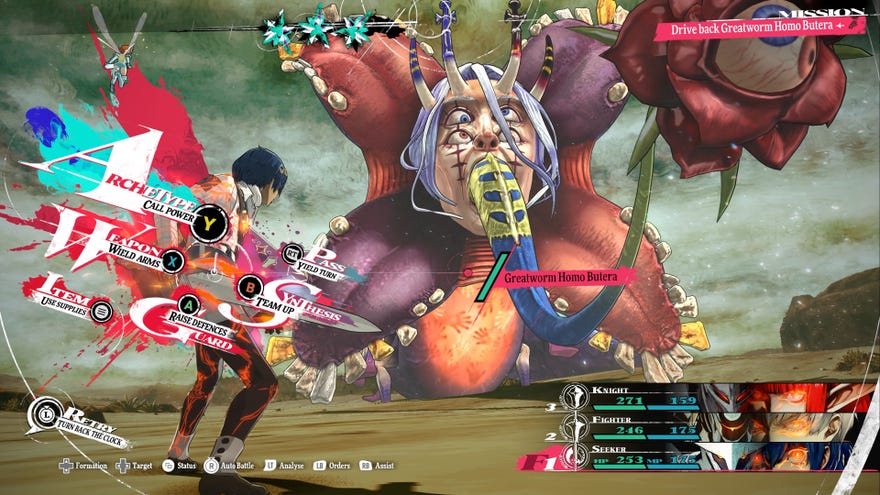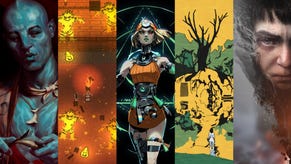Metaphor: ReFantazio plays like a high-fantasy Persona RPG with a curious hybrid combat system
School's out for the summoner
To start a modern Atlus game is to dive headfirst into an ice-cold bath of unbearably swish UI design, a brimming tub of Cool Fonts and Flash Segues. Metaphor: ReFantazio, the first (going by the colon usage) in a new series of RPGs helmed by Persona series director Katsura Hashino, is no exception. It might be set in a medieval fantasy realm, a relatively straight-laced world of square masonry and parchment maps, but it portrays bread-and-butter RPG fixtures with much the same flair as its strutting high school cousin.
Take victory screens. These fly you through an alchemical eyeball into a high-angled shot of your party slow-walking across gouts of paint, like an anime adaptation of Reservoir Dogs. There's also a level-up menu which looks like the Vitruvian Man reflected in a puddle of absinthe. Every layer of the interface, from equipment to roving the world map, has been tricked out and overclocked in such a way as to give the average Final Fantasy designer either wet dreams or nightmares or some combination of the two. The game's grander, hand-animated cutscenes are majestic, but they seem almost humdrum next to the supposedly routine business of opening your inventory.
As ever, there's the faint worry that the game beneath it all might turn out to be nothing special. Fear not, however. Metaphor: ReFantazio has the makings of another Atlus chart-topper, though it's not as exotic as I was expecting, and its divided approach to combat may well end up dividing players.
I had a chance to play three 15-minute slices from different parts of Metaphor's story at Summer Game Fest - a soupcon of introductory dungeon, a torn-off hunk of mid-game quest, and a slice of giant octopus bossfight to close. There wasn't really time and space to form coherent impressions of the new world and story, but here are some cliff notes.
In the world of Metaphor, "humans" are actually merciless, abstract monsters that look like Salvador Dali paintings sprung to life. There's a king, recently murdered, and nobles, some of whom are genuinely noble and some of whom are sneering crooks. You are an eerie travelling lad, or "fate-saddled child", called Elda, who begins the game with a reasonably non-irritating fairy friend, Gallica. You've got heterochromatic eyes, and appear to be the victim of some kind of make-believe prejudice, possibly involving your aptitude for magic. Over the next few dozen hours, you'll slowly gather a party of characters spanning various fantasy species, including a hench elf lady called Hulkenberg and a bush baby Yoda called Heismay. Each character has an Archetype - a summonable juggernaut which is essentially this game's version of Persona's personae.

The plot seems to be the usual RPG business of drifting towards a final encounter with a Big Bad, while taking on smaller quests such as rescuing hostages from a necromancer. You'll also spend time with party members to improve a relationship gauge, delve into backstories and unlock buffs and abilities. There's a calendar, also as in Persona, but I'm not sure you'll have to worry quite as much about timed events. Metaphor feels more like a Final Fantasy game, an impression supported by the presence of a clockwork steamship base, the Gauntlet Runner, in which to shoot the breeze with party members, do minigames such as fishing, tinker with your stats, and change your party line-up.
The overall ebb and flow of Metaphor seems pretty familiar. Slightly less familiar: the division of battle between real-time hack-and-slash and a turn-based system, which broadly serves as a way of minimising filler combat while over-levelled. Enemies range from your everyday many-coloured wolves to various enveloping humanoid deformities. They're visible and attackable in the field. You can defeat weaker opponents in real-time with button-mashy combos, without interrupting exploration. If an opponent is around the same level or stronger, however, whaling on them only fills up a "stagger bar" and lets you trigger a turn-based skirmish. Stagger your enemy or catch them behind in the field, and you'll snaffle a free blow in the subsequent encounter.
The turn-based combat itself lacks for a standout novelty element but feels as robust and involving as you'd expect from an Atlus joint. Characters fall into class roles - Hulkenberg is a paladin variant endowed with party support skills and the ability to jump on people very hard, while Heismay is a cute, brittle bundle of lightning, frost, and fireballs. Each character also gets abilities from their Archetype, including the chance to tag-team with another character's Archetype for a seismic finisher or mega-buff.

I was able to get through fights with standard enemies using a straightforward mix of regular attacks and the occasional kick in the status effects. The boss octopus, however, forced me to pay more attention to my supplies of magic points and other resources, timing buffs to ensure an even canopy of protection and give my glass cannon party members a chance to warm up their biggest moves. As is often the case with gargantuan octopi in RPGs, I had to decide whether to go for the creature's head, or pare away the tentacles it was lashing me with. I didn't get a chance to polish the upstart mollusc off before the demo timer cut me short, but I suspect there would have been a second or third phase to trip me up on the brink of victory.
I'm undecided about the real-time/turn-based split. It's the kind of baroque fixture Atlus games love to lean into, like a drunken uncle seriously overcommitting to a pun at Xmas dinner. The real-time combat doesn't feel especially clever or stylish, and could end up being an unnecessary kink thrown into what is fundamentally a turn-based RPG. On the other hand, I can get behind the idea of speeding the proceedings up while retracing your steps through roomfuls of squeaky low-level enemies. I guess the proof will be in the 60-hour pudding (a predicted playlength based on experience of the Persona games - Atlus haven't given a figure).


As for the plot and writing, I'm curious to see if this new venture for Katsura Hashino will shake off Persona's historic fondness for characterisations sprinkled with queer panic and transphobia. Persona has some of my favourite character writing in an RPG, including some gorgeous nascent queer characters, which makes its resorting to comedy stereotypes about, say, gay men as sexpests and predators seem outright mean-spirited. Metaphor doesn't have any player romance options, so there's slightly less opportunity for any such stereotypes to surface, and more room for fanshippers to apply their own interpretations, but of course, this sounds like sweeping the whole thing under the carpet. Being a "pure" fantasy story, Metaphor is also potentially less saddled with cultural baggage from other videogames, anime and light novels that are set in Japanese high schools.
I hope it's a change for the better, because as with Persona, this feels like a game of huge charm, swagger and enchantment that really ought to open its heart to everybody. It's got menus you'll want to print out, frame and possibly turn into cosplay, and a bustling, brain-boggling new world to explore. It's out 11th October.






